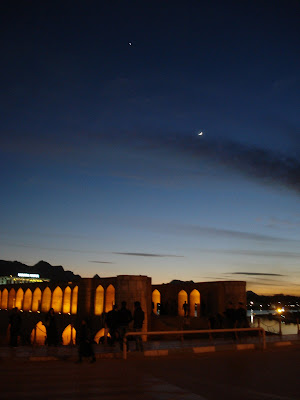Back to Reality
The realities in international chess-playing Iran are analyzed today by Bernard Avishai and Reza Aslan for the Washington Post.
While the notorious Bush Administration seems to be less willing in its last days to launch an attack on nuclear facilities in Iran, Israel still tackles the pros and cons. The arguments again and again circulate around the Iranian President and his unacceptable rhetoric. But that wiping-off-the-map ado has long been debunked as an intentionally wrong translation of a president’s not really diplomatic show-off who is not really the leader of the country. As Avishai and Aslan correctly state, Iran’s Supreme Leader Ayatollah Ali Khamenei, who alone commands Iran’s military and dictates foreign policy, has adopted a much softer tone with regard to nuclear negotiations with the West. Through his Vice President Esfandiar Rahim Mashaie, a close confidant of the President, the US was described recently as “one of the best nations in the world”. “Today, Iran is friends with American and Israeli people. No nation in the world is our enemy, this is an honor.” I had reported on that surprising turn in the Iranian Government recently elsewhere. So, Mr. Ahmadinejad is definitely not the strong leader as he would like to be seen. When recently asked in an interview by NBC, who leads Iran, his foreseeable answer was elusive.
Avishai and Aslan go even further. It may be clear in the meantime that the ‘fundamentalist’ caricature of the Mullah regime seeking, via the return of the Mahdi, the doomsday, the apocalypse, suicide and whatsoever is a ridiculous invention of interested circles in the West for preparing the public for possible military actions. The regime in Tehran desperately wants to survive. And moreover, why should they risk a co-destruction of the Palestinian territories by ‘wiping-off the map’ Israel by atomic bombs? But Tehran’s nuclear program (let’s assume it is not only for peaceful purposes) is far more modest than its leaders like to admit.
Avishai and Aslan list further arguments why it is, in their view, unlikely that Iran is or would be a threat for Israel or other countries in the region. Of course, knowing all that will not stop Mr. Ahmadinejad blustering. But who cares? The only way out of the dilemma is diplomacy.
While the notorious Bush Administration seems to be less willing in its last days to launch an attack on nuclear facilities in Iran, Israel still tackles the pros and cons. The arguments again and again circulate around the Iranian President and his unacceptable rhetoric. But that wiping-off-the-map ado has long been debunked as an intentionally wrong translation of a president’s not really diplomatic show-off who is not really the leader of the country. As Avishai and Aslan correctly state, Iran’s Supreme Leader Ayatollah Ali Khamenei, who alone commands Iran’s military and dictates foreign policy, has adopted a much softer tone with regard to nuclear negotiations with the West. Through his Vice President Esfandiar Rahim Mashaie, a close confidant of the President, the US was described recently as “one of the best nations in the world”. “Today, Iran is friends with American and Israeli people. No nation in the world is our enemy, this is an honor.” I had reported on that surprising turn in the Iranian Government recently elsewhere. So, Mr. Ahmadinejad is definitely not the strong leader as he would like to be seen. When recently asked in an interview by NBC, who leads Iran, his foreseeable answer was elusive.
Avishai and Aslan go even further. It may be clear in the meantime that the ‘fundamentalist’ caricature of the Mullah regime seeking, via the return of the Mahdi, the doomsday, the apocalypse, suicide and whatsoever is a ridiculous invention of interested circles in the West for preparing the public for possible military actions. The regime in Tehran desperately wants to survive. And moreover, why should they risk a co-destruction of the Palestinian territories by ‘wiping-off the map’ Israel by atomic bombs? But Tehran’s nuclear program (let’s assume it is not only for peaceful purposes) is far more modest than its leaders like to admit.
Avishai and Aslan list further arguments why it is, in their view, unlikely that Iran is or would be a threat for Israel or other countries in the region. Of course, knowing all that will not stop Mr. Ahmadinejad blustering. But who cares? The only way out of the dilemma is diplomacy.
First published at Freelance.



Comments